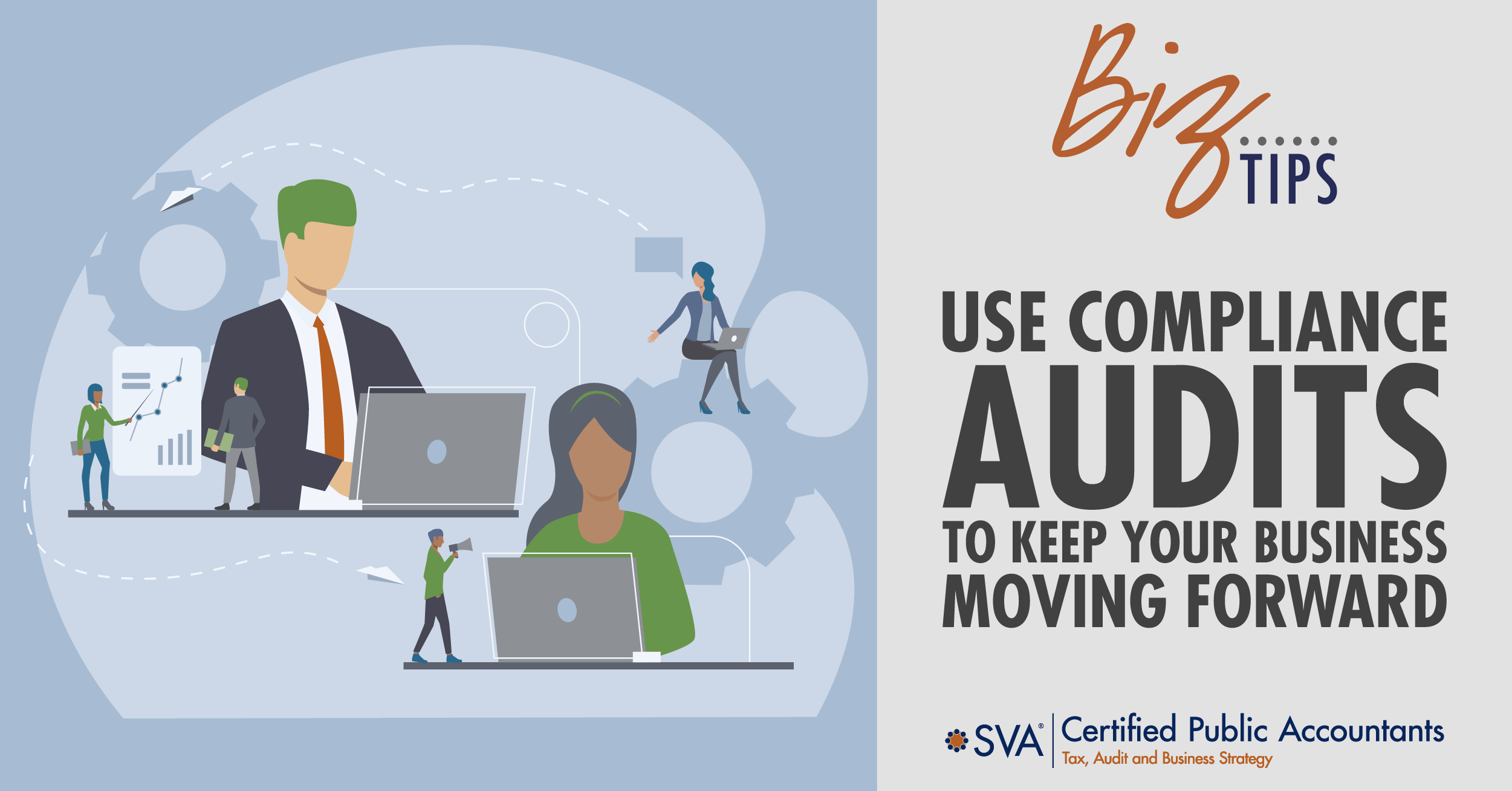| Highlights: |
- The article explains how compliance audits help organizations evaluate adherence to laws, regulations, and internal policies, reducing risk and supporting operational continuity.
- It outlines common compliance areas, including regulatory requirements, contractual obligations, and internal controls, and how audits identify gaps before issues escalate.
- The post highlights how proactive compliance audits improve transparency, strengthen governance, and provide confidence to stakeholders, lenders, and regulators.
|
Compliance may not be on the minds of many business owners, as they focus on helping customers and clients and on growing the company. But what happens to your company's reputation when a compliance problem goes public?
There are a few different types of compliance audits including financial, operational, environmental, and industry-specific audits. Use the information below to review your business to ensure you are in compliance.
(Download Video Transcript)
Financial Compliance Audits
These audits focus on a company's financial statements and records to ensure they comply with relevant laws and regulations, such as the Sarbanes-Oxley Act (SOX) and Generally Accepted Accounting Principles (GAAP).
What is a Financial Compliance Audit?
Financial compliance audits are those that focus on a company's financial statements and records to ensure they comply with relevant laws and regulations. Independent auditors, such as certified public accountants (CPAs), typically perform these audits.
They are designed to assure that a company's financial statements are accurate, complete, and in compliance with Generally Accepted Accounting Principles (GAAP) and International Financial Reporting Standards (IFRS), as well as any other laws and regulations that may apply.
What is Reviewed During the Audit?
The scope of a financial compliance audit may include reviewing a company's financial statements (such as the balance sheet, income statement, and cash flow statement) to ensure they are accurate and complete.
Auditors will also test the internal controls and procedures a company has in place to ensure that financial data is accurate and reliable and that assets are appropriately accounted for.
Are Financial Compliance Audits Required?
Financial compliance audits are required for publicly traded companies by the Sarbanes-Oxley Act (SOX) and other companies by various laws and regulations. These audits are also done by regulatory bodies such as the Securities and Exchange Commission (SEC) and the Financial Industry Regulatory Authority (FINRA).
The Goal of the Audit
A financial compliance audit aims to ensure that a company's financial statements are accurate and in compliance with all relevant laws and regulations, as well as to help identify and correct any issues or weaknesses in the company's financial controls and procedures.
Operational Compliance Audits
These audits focus on a company's internal operations and processes (such as human resources and IT systems) to ensure they comply with relevant laws and regulations, such as the Health Insurance Portability and Accountability Act (HIPAA) and the Occupational Safety and Health Act (OSHA).
What is an Operational Compliance Audit?
Operational compliance audits focus on a company's internal operations and processes to ensure they comply with relevant laws and regulations.
These audits look at specific areas of a company's operations (such as human resources, IT systems, and supply chain management) to ensure they comply with relevant laws, standards, and regulations.
What is Reviewed During the Audit?
During an operational compliance audit, auditors will review company policies and procedures, interview employees, and observe processes to ensure they follow laws and regulations such as the Health Insurance Portability and Accountability Act (HIPAA), the Occupational Safety and Health Act (OSHA), and the Fair Labor Standards Act (FLSA).
The audit may also focus on specific areas such as IT security, data privacy, and business continuity planning. Auditors may also review the company's incident management and incident response plans to ensure they are well-documented and can be effectively executed in case of a security breach or other emergency.
Goal of the Audit
The goal of an operational compliance audit is to identify and correct any issues or weaknesses in the company's operations that may be in violation of laws and regulations and may put the company at risk of fines or penalties. This type of audit also ensures that the company's operations are consistent with the company's compliance policies and procedures.
Compliance Program Audits
These audits focus on a company's overall compliance program (including policies, procedures, and training) to ensure they are effectively designed and implemented.
What is a Compliance Program Audit?
Compliance program audits are those that focus on a company's overall compliance program. These audits are designed to evaluate the effectiveness of a company's policies, procedures, and training in ensuring compliance with relevant laws and regulations.
What is Reviewed During the Audit?
During a compliance program audit, the auditor will review the company's compliance policies and procedures, interview employees and management, and observe compliance-related activities. The auditor will also assess the company's compliance training program and evaluate whether it is adequate and effectively delivered to all employees.
The auditor will then document any findings and make recommendations for improvements to the company's compliance program. These findings may include recommendations for updating policies and procedures, strengthening training programs, or implementing new processes to ensure compliance with relevant laws and regulations.
Goal of the Audit
The goal of a compliance program audit is to identify any weaknesses or gaps in the company's compliance program and to help the company improve its compliance efforts and reduce the risk of non-compliance.
This type of audit is particularly important for companies that operate in heavily regulated industries such as healthcare, financial services, and energy.
Environmental Compliance Audits
These audits focus on a company's compliance with environmental laws and regulations, such as the Clean Air Act and the Clean Water Act.
What is an Environmental Compliance Audit?
Environmental compliance audits are those that focus on a company's compliance with environmental laws and regulations.
The purpose of these audits is to assess a company's compliance with laws and regulations related to air, water, waste, and other environmental concerns (such as the Clean Air Act, Clean Water Act, and Resource Conservation and Recovery Act).
What is Reviewed During the Audit?
During an environmental compliance audit, an auditor will review a company's operations, processes, and records to determine compliance with relevant laws and regulations. The auditor will also inspect the company's facilities and equipment to identify any potential environmental hazards or non-compliant practices.
The auditor will also check for compliance with the permits and licenses the company holds and ensure that the company has the necessary plans and procedures in place to prevent and respond to environmental incidents.
If any non-compliance is found, the auditor will provide recommendations for corrective action to bring the company back into compliance. The company will have to report the findings to relevant regulatory agencies and take action to correct any identified deficiencies.
Goal of the Audit
Overall, environmental compliance audits are important for protecting the environment and ensuring that companies are operating in a manner that is safe for the community and the environment.
Industry-Specific Compliance Audits
Some industries (such as banking, insurance, and pharmaceuticals) have specific compliance requirements. Audits are conducted to ensure compliance with those regulations.
What are Industry-Specific Compliance Audits?
Industry-specific compliance audits focus on the laws and regulations that are specific to a particular industry. For example:
| Banking Compliance Audits |
Banks are subject to a wide range of laws and regulations (such as the Bank Secrecy Act and the Gramm-Leach-Bliley Act) which are aimed at preventing money laundering and protecting consumer financial information. Banks are also subject to regulations related to capital requirements, interest rate risk management, and consumer protection. Compliance audits in this industry focus on ensuring that the bank is adhering to these regulations and have adequate internal controls in place. |
| Insurance Compliance Audits |
Insurance companies are subject to laws and regulations related to solvency, consumer protection, and fair claims practices. Compliance audits in this industry focus on ensuring that the company is adhering to these regulations, has adequate risk management processes in place, and is treating policyholders fairly. |
| Pharmaceutical Compliance Audits |
Pharmaceutical companies are subject to laws and regulations related to the safety and efficacy of their products, as well as regulations related to the marketing and advertising of their products. Compliance audits in this industry focus on ensuring that the company is adhering to these regulations and has adequate processes in place for monitoring the safety of its products. |
| Healthcare Compliance Audits |
Healthcare providers and facilities are subject to laws and regulations related to patient privacy and data security (HIPAA), as well as regulations related to billing and reimbursement, medical record keeping, and quality of care. Compliance audits in this industry focus on ensuring that the company is adhering to these regulations and has adequate internal controls in place. |
Goal of the Audit
Industry-specific compliance audits are conducted to ensure that a company is adhering to the laws and regulations that are specific to its industry, and to identify and correct any issues or weaknesses in the company's compliance program.
Don't Forget About Compliance as You Run Your Business
Compliance audits are conducted to ensure that a company is adhering to laws and regulations that affect its operations, and to identify and correct any issues or weaknesses in the company's compliance program.
Yes, it is easier to focus on helping customers and growing your business, but not making sure your company is compliant can lead to problems down the road.
If you have any questions about these compliance audits or wondering if your company is required to have these audits performed, reach out to one of our professionals.
© 2023 SVA Certified Public Accountants

